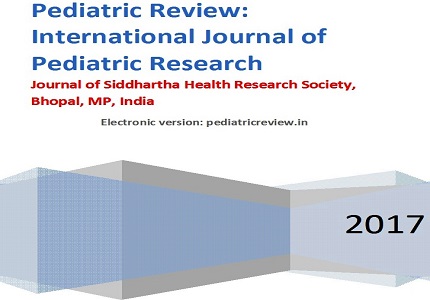Knowledge of febrile convulsion among mothers attending the paediatric clinic of university of Uyo teaching hospital, Nigeria
Abstract
Background: Febrile convulsion is a common emergency encountered in Paediatric practice. Inadequate knowledge could result in parental anxiety, apprehension and improper home management.
Aim: To determine the knowledge, attitude of mothers, and home management of febrile convulsion in Uyo. Methods: A fourteen-itemed questionnaire bordering on knowledge, attitudes and home management of febrile convulsion was completed by mothers who brought their children to the Children’s Outpatient Clinic of the University of Uyo Teaching Hospital, Uyo.
Results: of the one hundred and sixty-five respondents, 154 (93.4%) were married, 162 (98.2%) were Christians and 110 (66.7%) had tertiary education. Majority (84.2%) knew that febrile convulsion occur as a result of fever, 25 (15.2%) believed that febrile convulsion is caused by evil spirit and 5(3.0%) by black magic. Significantly more mothers whose children had febrile convulsion believed that febrile convulsion is caused by evil spirit (p=0.04). Various treatments agreed by respondents include application of palm oil on the body -23(13.9%), rushing the child to the hospital -153(92.7%), insertion of spoon into the mouth–51(30.9%), instillation of onions juice into the eyes –19(11.5%), cow’s urine concoction -4(2.4%). Mothers with children with febrile convulsion preferred the application of palm oil on the body during seizure episode (p=0.03).
Conclusion: There is good knowledge of febrile convulsion among mothers attending the paediatric clinic of the university of Uyo teaching hospital. Public health education on this subject should be intensified to cater for the mothers with poor knowledge of the cause, treatment and prevention of febrile convulsion.
Downloads
References
2. Bethesda, MD. Febrile seizures: consensus development conference summary. NIH: 1980; vol3(2).
3. Commission on epidemiology and prognosis. International League Against Epilepsy. Guidelines for epidemiologic studies on epilepsy. Epilepsia 1993; 34: 592-5. [PubMed]
4. Familusi JB, Sinnette CH. Febrile convulsions in Ibadan children. Afr J Med Sci. 1971 Apr;2(2):135-50.
5. Berg AT, Shinnar S. Complex febrile seizures. Epilepsia. 1996 Feb;37(2):126-33.
6. Fagbule D, Chike-Obi UD, Akintunde EA. Febrile convulsion in Ilorin. Nig J Paediatr 1991; 18: 23-7.
7. Izuora GI, Azubuike JC. Prevalence of seizure disorders in Nigerian children around Enugu. East Afr Med J. 1977 May;54(5):276-80.
8. Ibeziako SN, Ibekwe RC. Pattern and outcome of admission in the children’s emergency room of University of Nigeria Teaching Hospital, Enugu. Nig J Paediatr 2002; 29: 103-8.
9. Angyo IA, Lawson JO, Okpeh ES. Febrile convulsion in Jos. Nig J Paediatr 1997; 24(1): 7-13.
10. Eseigbe EE, Adama SJ, Eseigbe P. Febrile seizures in Kaduna, north western Nigeria. Niger Med J. 2012 Jul;53(3):140-4. doi: 10.4103/0300-1652.104383.
11. Akpan MU, Abasiubong F, Nyong EE. Pre-hospital treatment and outcome of status epilepticus in children in Nigeria. Case Study Case Rep. 2011; 1(2): 82-91.
12. Anochie I, Graham-Douglas IB. Non-accidental injuries associated with convulsions in Port Harcourt, Nigeria. Anil Aggrawal’s internet J Forensic Med and Tox 2006; 1(2). Available from: http://www.anilaggrawal.com/ij/vol_001_no_002/paper009.html.
13. Ndukwe KC, Folayan MO, Ugboko VI,Elusiyan JBE, Laja OO. Orofacial injuries associated with prehospital management of febrile convulsion in Nigerian children. Dental Traumatology 2007; 23: 72-75. DOI: 10.1111/j.1600-9657.2005.00411.x.
14. Oche OM, Onankpa OB. Using women advocacy groups to enhance knowledge on home management of febrile convulsion among mothers in a rural community of Sokoto State, Nigeria. Pan Afr Med J. 2013; 14(1): 49. DOI: 10.11604/pamj.2013.14.49.1703.
15. Parmar RC, Sahu DR, Bavdekar SB. Knowledge, attitude and practices of parents of children with febrile convulsion. J Postgrad Med. 2001 Jan-Mar;47(1):19-23. [PubMed]
16. Nyaledzigbor M, Adatara P, Kuug A, Abotsi D. Mothers’ knowledge, beliefs and practices regarding febrile convulsion and home management: A study in Ho, Ghana. J Res Nurs and Midwif (JRNM) DOI:http:/dx.doi.org/10.14303/JRNM.2016.010.
17. Syahida JA, Risan NA, Tarawan VM. Knowledge and attitude on febrile seizure among mothers with under five children. Aithea Med J. 2016;3(4) 649-654. DOI: 10.15850/amj.v3n4.954.
18. Anigilaje EA, Anigilaje OO. Perception of childhood convulsion among women in a peri-urban community in Ilorin, Nigeria. IORS J of Dental and Med Sci. 2013; 4(5): 32-8. Available from: www.iosrjournals.org/iosr-jdms/papers/Vol4-issues5/H0453238.pdf.
19. Ndukwe KC, Folayan MO, Ugboko VI, Elusiyan JBE, Laja OO. Orofacial injuries associated with pre-hospital management of febrile convulsion in Nigerian children. Dental Traumatology 2007;23: 72-5.
20. Jarett OO, Fatunde OJ, Osinusi K, Lagungul A. Pre-hospital management of febrile seizure in children seen at the university college hospital Ibadan, Nigeria. Ann Ibd Pg Med. 2012; 10(20): 6-10. Available from: https://www.ncbi.nlm.nih.gov/pmc/articles/PMC4111051/pdf/AIPM-10-6.pdf.
21. Atalabi O. Cow’s urine concoction. Dokita. 1964; 6: 1-4.
22. Oyebola DD. Cow's urine concoction: its chemical composition, pharmacological actions and mode of lethality. Afr J Med Med Sci. 1983 Mar;12(1):57-63. [PubMed]
23. Ojinnaka NC. Teachers’ perception of epilepsy in Nigeria: a community based study. Seizure 2002; 11: 386-391. Available from: https://pdfs.semanticscholar.org/da99/0fb963460c6d7b367c8e614f380b17a479fd.pdf

Copyright (c) 2017 Author (s). Published by Siddharth Health Research and Social Welfare Society

This work is licensed under a Creative Commons Attribution 4.0 International License.


 OAI - Open Archives Initiative
OAI - Open Archives Initiative


